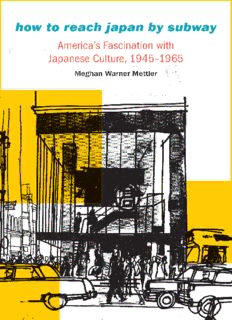
How to Reach Japan by Subway: America’s Fascination with Japanese Culture, 1945–1965 PDF
Preview How to Reach Japan by Subway: America’s Fascination with Japanese Culture, 1945–1965
How to Reach Japan by Subway studies in pacific worlds Series Editors Rainer F. Buschmann Katrina Gulliver Editorial Board Gregory Cushman John Gascoigne Andrea Geiger Noriko Kawamura Judith Schachter H O W T O R E A C H J A PA N B Y S U B WAY America’s Fascination with Japanese Culture, 1945– 1965 meghan warner mettler university of nebraska press | lincoln and london © 2018 by the Board of Regents of the University of Nebraska Portions of this book originally appeared as “Gimcracks, Dollar Blouses, and Transistors: American Reactions to Imported Japanese Products, 1945– 1964” in Pacific Historical Review 79, no. 2 (2010): 202– 30. “Buddhism Now and Zen” by Felicia Lamport originally appeared in Scrap Irony (Boston: Houghton Mifflin, 1961). All rights reserved Manufactured in the United States of America Library of Congress Control Number: 2017041405 Set in Sabon Next by Mikala R Kolander. Designed by N. Putens. For Peter CONTENTS List of Illustrations ............................. ix Acknowledgments ............................. xi Introduction ...................................1 1. Humble Leaders of the Free World: Historical Context of the Shibui Aesthetic ..........19 2. Samurai at the Sure Seaters: 1950s “Highbrow” Japanese Movies in the United States .............. 45 3. Friendship through Flowers: Americans’ Appreciation of Ikebana and Bonsai .....69 4. How to Be American with Shibui Things: Japanese Aesthetics in the American Home .........99 5. Satori in America: Intellectuals and Artists Discover Zen Buddhism ....................... 131 6. Zen Goes “Boom”: The Popularity of Zen Buddhism, Both Beat and Square ................ 157 7. Japan for the Rest of Us: Non- Shibui Japanese Imports in the Postwar Era ......................181 Conclusion ..................................207 Notes .......................................217 Bibliography .................................247 Index .......................................263 ILLUSTRATIONS 1. Japanese American evacuation from West Coast, April 1942 ...............................38 2. Still from the film Rashomon, 1950 ................. 51 3. Ikenobo arrangement ...........................72 4. Example of Saga Goryū moribana kōseitai (hidarigatte) style ..............................73 5. Map of Ikebana International chapters in the United States in 1962 ...........................77 6. Example of jiyuka freestyle arrangement ...........85 7. Example of bonsai .............................89 8. A typical sho- in style interior. . . . . . . . . . . . . . . . . . . .102
Description: